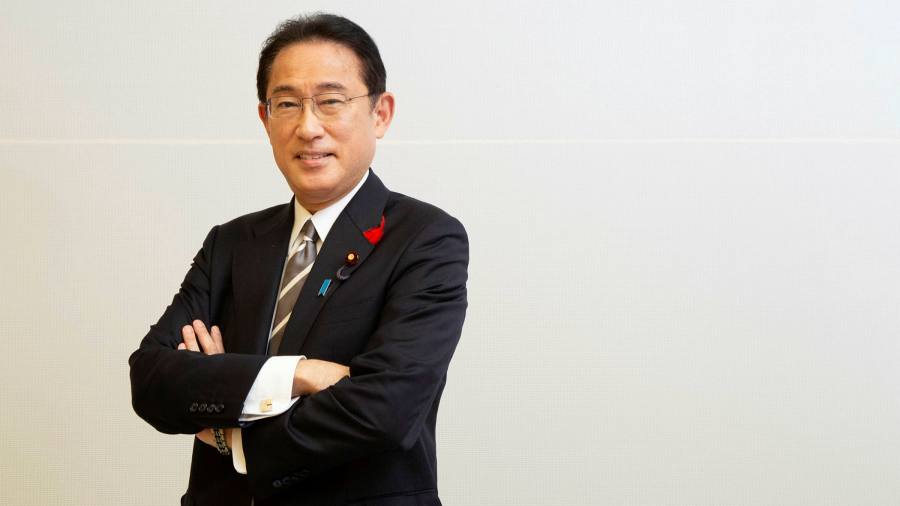Japan’s new prime minister has vowed to steer the country away from neoliberal fundamentalism while lashing out at his own party’s failure to achieve broader growth under the Abenomics program that defined the economy for nearly a decade.
In his first interview with international media since taking over the leadership of Japan this month, Fumio Kishida told the Financial Times that while regulatory reform was still necessary, he would approach it with a focus on narrowing the gap between rich and poor.
“Abenomics clearly delivered results in terms of gross domestic product, corporate earnings and employment. But it failed to get to the point of creating a ‘virtuous cycle,’ “Kishida said, in his most forceful attack on a program adopted by his two predecessors that boosted the Tokyo stock market through a doubling in value.
“I want to achieve a virtuous economic cycle by increasing the income not only of a certain segment, but of a wider range of people to trigger consumption. I think that’s the key to how the new form of capitalism is going to be different from the past, “he added.
In Japan, “neoliberalism” more often refers to reforms of the 1990s and 2000s, including deregulation, privatization, and labor market reform, rather than strict fiscal policy and cuts in public spending.
By implicitly criticizing Shinzo Abe, Japan’s longest-serving prime minister who resigned in September 2020, Kishida is taking a calculated risk as he prepares for the October 31 general election.
Recent polls have shown him with an average approval rating of just over 50 percent, considerably lower than most of his predecessors when they took office and a sign, political analysts said, that his honeymoon period to enact Meaningful renovations can be short.
Fumio Kishida
© Shoko Takayasu / Bloomberg
CURRENT ROLE
He took over as prime minister this month when he was chosen to head the ruling Liberal Democratic Party, replacing Yoshihide Suga.
EDUCATION
Waseda University
PREVIOUS PAPERS
Minister of Foreign Affairs and Defense. He also heads the Kochikai faction of 47 members of the LDP.
JOBS OUT OF POLITICS
Formerly with Long-Term Credit Bank of Japan, now Shinsei Bank
POLITICS AND PERSONALITY
It has committed to stimulus packages related to the coronavirus and the continuation of aggressive monetary policy, while calling for a more equitable distribution of wealth. It previously negotiated a deal to solve the ‘comfort women’ issue, but the 2015 deal with South Korea subsequently fell apart.
The former foreign minister was chosen to replace Yoshihide Suga as leader of the ruling Liberal Democratic Party on the understanding that he would offer stability and continuity in the “status quo.”
Despite attempts to remove that image, he has already backtracked on one of his major policy initiatives to increase the capital gains tax after stock prices plummeted due to concerns such a move would kill a recent resurgence of interest from individual national investors.
Kishida emphasized that his new economic approach, which includes tax incentives for companies to raise wages and pay increases for nurses and healthcare workers, would attempt to reverse the failures of “trickle-down” theories and market-driven reforms. that have guided Japanese policymaking since the mid-2000s.
“Everyone views regulatory reform in terms of market fundamentalism, competition, and survival of the fittest. That’s the problem with our earlier thinking on regulatory reform, ”Kishida said, asking businesses and the public to share a more holistic view of the economy.
It also envisions deeper collaboration between the state and the private sector to secure strategic assets and technologies such as chips and rare earths that will be critical to economic security.
“It is important to ensure a self-sufficient economy when we are considering future growth,” Kishida said. “We need to ensure that Japan has technologies that are critical to completing global supply chains so that we can achieve indispensable.”
Kishida publicly signaled for the first time that it could also adopt a new approach to corporate governance reform that has been a mainstay of the Abenomics program alongside aggressive monetary easing and fiscal stimulus.
While Japan introduced its first corporate governance code in 2015, Kishida said a separate code might be necessary to address the needs of small and medium-sized businesses. “It is not realistic to apply the same rules. Corporate governance is important for small and medium-sized companies, but they cannot do it in the same way as large companies,” he explained.
Corporate executives have privately expressed skepticism about the new prime minister’s economic agenda, pointing out how Japan has failed to emerge from deflation and has failed to open rigidly regulated markets even after nearly nine years of strong public support for Abenomics.
Kishida also faces a more complex geopolitical environment than its predecessors, with China’s growing assertiveness and a global rush to secure national supply chains following turmoil caused by the coronavirus pandemic.
When asked about the new trilateral security partnership that the United States has launched with the United Kingdom and Australia to strengthen its ability to counter China, Kishida said that Japan had no specific plans to join the framework.
But he added: “Considering the stability of the region, it is extremely important that European and American countries are interested and involved in the Asian security environment.”
Kishida heads a faction of the LDP with a historically moderate stance on China, but as prime minister, he has called for a strengthening of the country’s missile and defense capabilities.
For the next elections, the ruling party included for the first time a manifest commitment to double defense spending, in a break with the long tradition of keeping its military budget within 1% of GDP.
“On the economic front, it is important to stabilize relations with China,” Kishida said, before pointing to recent “questionable behavior” by Beijing.
“So at the political level, Japan must be able to assert itself firmly against China.”
